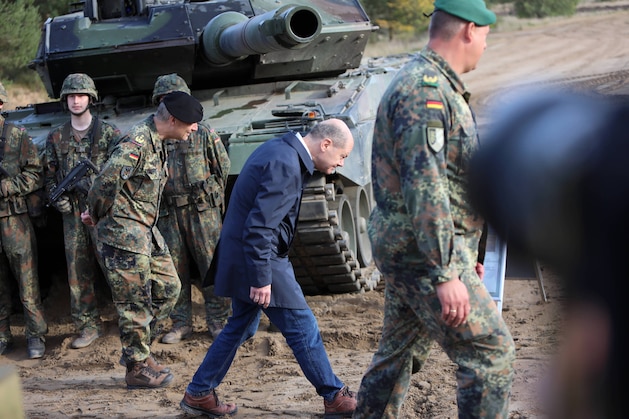Apparently, Germany wants to allow Poland to deliver Leopard 2 tanks to Ukraine as early as Wednesday. The political misfortune that brought about this debate can no longer be avoided. At least it’s a good thing that Putin has a problem if the war escalates further.
The German debate about the delivery of heavy battle tanks to Ukraine is politically unfortunate: tanks are delivered and the public is informed when they have been delivered, or else they are not delivered. But there is no debate about it, in which after a while half the world takes part, especially the Kremlin and its spokesman, who intervene in the debate with disruptive actions.
The talk that has since arisen not only damages Germany’s position in NATO, it weakens it overall and is an invitation to Russia to continue to engage in these debates. What we are observing here is not democracy, but political clumsiness.
Basically, when it comes to supplying Ukraine with what it needs, as German politicians say, with the exception of the AfD and Die Linke, then it is about coordinated weapon systems, about war equipment that complements and is compatible with each other , and not about deliveries on demand, where military laymen have the big say.
The delivery of 40 Marder armored personnel carriers, which has since been decided, makes sense if they are to be used to defend against a major Russian offensive expected for the spring, especially if the armored personnel carriers can be used in combination with main battle tanks. So it would have made sense to make the decision on Marder and Leopard tanks together.
Above all, however, it would have been correct if Germany had been given the order to build at least 100 Leopard tanks immediately after the start of the Russian attack, so that one year after the start of the war it was not necessary to check how many of them one actually had, which of them are operational and what could possibly be given away.
Forward-looking politics looks different. And no matter how the decision-making process for the delivery of a main battle tank turns out, she would already ensure that Ukrainian soldiers are trained on the tank. Such foresight would enable Germany, NATO, and the West to be able to react quickly and not always lag behind Russian escalation steps with some time lag.
In short: What we are currently experiencing is a serious deficit in strategic thinking and action. This deficit is the real trigger for all the talk about arms deliveries. This confirms the contempt for authoritarian regimes that think they are superior to the democratic order.
Leaving them to believe that is dangerous, certainly more dangerous than delivering main battle tanks – if they actually have them – to Ukraine right now.
And the Russian threats that this will lead to an escalation of the war? So far, the Russians have escalated the war when they saw it as necessary from their situational picture, and not when the West was discussing the delivery of more and more modern weapons. They only interfered in these discussions with threats. Otherwise, the Russian army will have such big problems in Ukraine that it will at all costs avoid drawing additional countries into the war.
Above all, however, Putin has a political problem with a further escalation of the war, and that does not come from the West, but from China. Xi Jinping is in dire need of a global economic recovery, and he has made it abundantly clear to Putin that a further escalation of the war that would draw in European countries would put him at a distance. But Putin is much more dependent on China than China is on Russia. This is where economic power still matters.
The FOCUS Online guide answers all important questions about pensions on 135 pages. Plus 65 pages of forms.
It cannot be ruled out that if the war situation changes, Ukraine’s air defense capabilities could be more important than strengthening the ground forces with main battle tanks. Germany has been active here for a long time, be it with the anti-aircraft vehicle Gepard or with the IRIS-T system.
The remarkable thing is that at least the delivery of IRIS-T has been fairly quiet, although it has resulted in a significant upgrade of Ukraine’s air defenses. Why actually? Probably because it has less symbolic power than tanks, which are actually a 20th century war machine.
If that is the case, then in Germany we are conducting debates that are shaped more by symbols of war than by the actual effectiveness of the weapon systems. And that in turn shows that the current debate is more about German sensitivities than about the actual effects of arms deliveries.
Herfried Münkler, born in 1951, is Professor Emeritus of Political Science at Berlin’s Humboldt University. Many of his books are considered standard works, such as “The Great War” (2013), “The New Germans” (2016) or “The Thirty Years’ War” (2017). Herfried Münkler has received numerous awards, including the Science Prize of the Aby Warburg Foundation and the Carl Friedrich von Siemens Fellowship.








